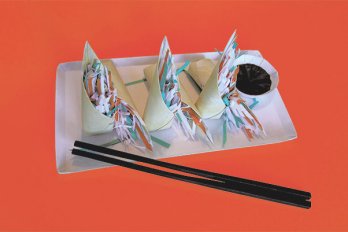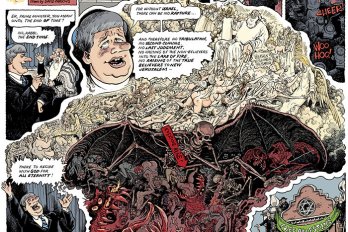In September 1991, while working for CTV News, I found myself in Moscow shortly after the failed coup d’état that led to the dissolution of the Soviet Union. It was my second visit to the Russian capital. I had gone there in 1974 to write about a hockey tournament between the Soviets and an all-star team drawn from the new World Hockey Association that included Bobby Hull and Gordie Howe. Although Ronald Reagan had yet to publicly utter the words “evil empire,” it was the height of the Cold War, and we were pretty sure our rooms at the Rossiya Hotel—then the world’s largest and certainly one of its ugliest—were bugged. But my most vivid memory from that trip is of a crude grey vending machine near Red Square that dispensed drinks (water? vodka? I couldn’t tell which) into a chipped communal glass. Apparently, the country that put Sputnik into orbit couldn’t build a sanitary vending machine.
Over the next seventeen years, the computer chip transformed Western society. Mechanized consumer goods, from cars to computers, were better built and—because they were often conceived on computers—better designed, too. So I was surprised to discover that this was not the case in Moscow, where in 1991 you still heard the quaint ring of cash registers; and the homely Lada, whose mechanical shortcomings were even then legendary, still ruled the streets. This time, I was staying at a beautiful hotel, the Metropol, which was built before the Russian Revolution and had recently been restored with the help of the Finns. But not far away and still in use—if I hadn’t seen it, I wouldn’t have believed it—was that decrepit grey vending machine (or one just like it), a symbol if ever there was one of Communism’s inability to keep pace economically with the West.
If Mikhail Gorbachev’s economic reforms ( perestroika) were an obvious failure, his social reforms ( glasnost) had perhaps succeeded too well. In 1989, bloodless revolutions overturned Communist regimes in Poland, Hungary, East Germany, and Czechoslovakia. In Romania, Nicolae CeauÈescu tried to put down protests with force, but he was eventually defeated and, with his wife, Elena, murdered in a parking lot. Within the Soviet Union, Georgia, Latvia, Lithuania, and Estonia had declared their independence, and just two months before the August coup Boris Yeltsin asserted Russia’s sovereignty. Soviet-style Communism was in full retreat, and Communist hardliners blamed Gorbachev.
By the time I arrived, Gorbachev, a hostage for three days in his Crimean dacha, was back in Moscow, trying to forestall the inevitable. Officially, the Soviet Union would not cease to exist until he resigned four months later, but even a visitor could feel its grip loosening. Over the years, I’ve observed everyday life in half a dozen repressive societies, most recently in Cairo, just weeks before the Egyptian revolution began in Tahrir Square. But until that second visit to Moscow, I had never experienced the phenomenon Paul Wilson describes in his article on Egypt’s Arab Awakening (“Adrift on the Nile,”)—namely, the absence of fear among people who have never known anything else. In Moscow, it was most noticeable at the airport, where soldiers with automatic weapons chatted amiably among themselves and even smiled at strangers; for a moment, the city seemed almost giddy.
Of course, the giddiness was tinged with anxiety, because in the aftermath of revolution there is always uncertainty. In the eyes of those Russian soldiers, I also saw bewilderment; from whom were they now to take orders? Similarly, it was uncertainty that moved a Coptic Christian revolutionary to tell Paul Wilson that Egypt should shun democracy if it might possibly deliver the country into the hands of radical Islamists. Yes, the twenty-year-old democracy that emerged from the collapsed Soviet Union is far from perfect, but few Russians would wish to turn back the clock. Democracy, as so many have said, is messy. But even at its messiest—to wit: the recent, embarrassing debt ceiling crisis in Washington—it is preferable to systems in which people live their lives in perpetual fear. In the years to come, China may surpass the United States materially, the metaphoric chipped glass having changed hands. But the Americans, unlike the Chinese, are free. And, as the revolutionaries in Tahrir Square have already learned, freedom comes at a price.
This appeared in the October 2011 issue.




